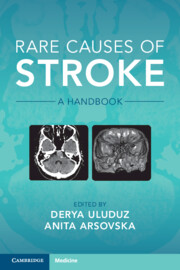Book contents
- Rare Causes of Stroke
- Rare Causes of Stroke
- Copyright page
- Contents
- Contributors
- Preface
- 1 Inflammatory Conditions
- Chapter 1.1 Isolated Vasculitis of the Central Nervous System
- Chapter 1.2 Primary Systemic Vasculitis
- Chapter 1.2 Chapter
- Chapter 1.3 Vasculitis Secondary to Systemic Disease
- 2 Infectious and Postinfectious Vasculitis
- 3 Hypercoagulable Causes of Stroke
- 4 Drug-Related Stroke
- 5 Hereditary and Genetic Causes of Stroke
- 6 Rare Causes of Cardioembolism
- 7 Vasospastic Conditions and Other Vasculopathies
- 8 Other Non-inflammatory Vasculopathies
- 9 Venous Occlusive Conditions
- 10 Bone Disorders and Stroke
- Index
- References
Chapter 1.2 - Chapter
from 1 - Inflammatory Conditions
Published online by Cambridge University Press: 06 October 2022
- Rare Causes of Stroke
- Rare Causes of Stroke
- Copyright page
- Contents
- Contributors
- Preface
- 1 Inflammatory Conditions
- Chapter 1.1 Isolated Vasculitis of the Central Nervous System
- Chapter 1.2 Primary Systemic Vasculitis
- Chapter 1.2 Chapter
- Chapter 1.3 Vasculitis Secondary to Systemic Disease
- 2 Infectious and Postinfectious Vasculitis
- 3 Hypercoagulable Causes of Stroke
- 4 Drug-Related Stroke
- 5 Hereditary and Genetic Causes of Stroke
- 6 Rare Causes of Cardioembolism
- 7 Vasospastic Conditions and Other Vasculopathies
- 8 Other Non-inflammatory Vasculopathies
- 9 Venous Occlusive Conditions
- 10 Bone Disorders and Stroke
- Index
- References
Summary
Lymphomatoid granulomatosis is rare EBV mediated lymphoproliferative disorder occurring within the 4th to 6th decade, with most risk factors relating to an immunocompromised state. Histological analysis shows an angiocentric and angiodestructive infiltrate with varying degrees of necrosis and atypical EBV positive cells. The lungs are the primary site of involvement in over 90% of cases but central nervous system involvement can occur alongside or in isolation. Neurological presentation is varied and MRI commonly displays focal white matter parenchymal lesions. A brain biopsy may be required to exclude competing diagnoses or in the absence of identifiable disease elsewhere. Treatment depends on stage of disease and can range from observation, withdrawal of immunosuppressive regimes or aggressive chemo/immunotherapy
Keywords
- Type
- Chapter
- Information
- Rare Causes of StrokeA Handbook, pp. 40 - 44Publisher: Cambridge University PressPrint publication year: 2022

